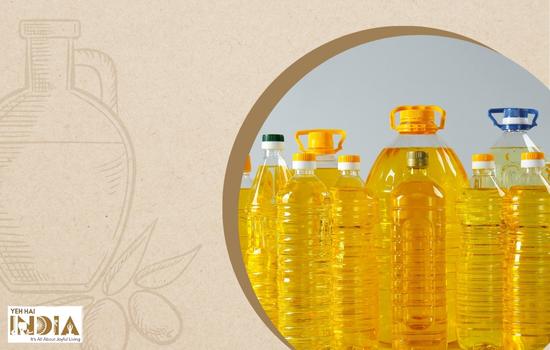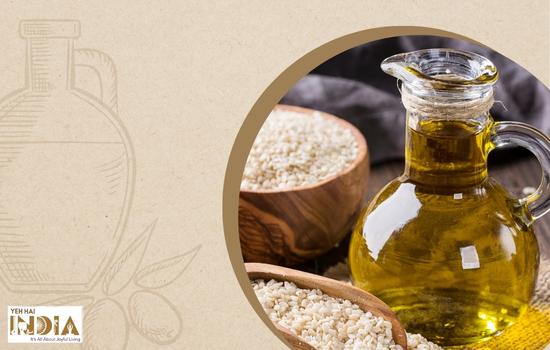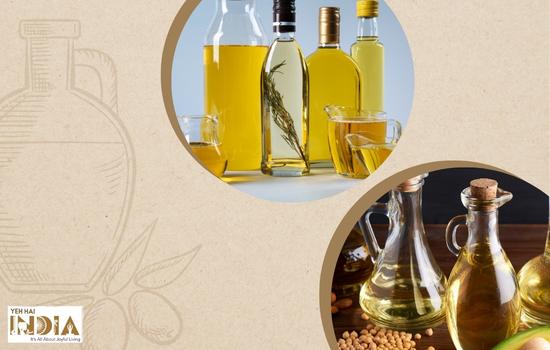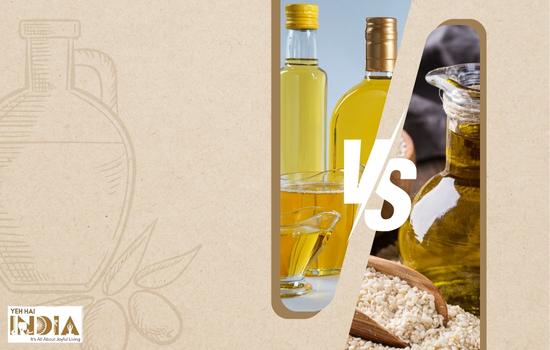Unravel the importance of refined oil vs filtered oil, their processing methods, nutritional profiles, and potential health impacts. This article will help you make informed decisions about the oils that grace your kitchen.
Why is oil important in daily diet?
Everything that we cook requires oil. And on the other hand, your nutritionist is ranting behind you to restrict oil in your diet.
So, let’s get a little practical here. First of all, it is impossible to be on 0 oil in your diet. Second of all, it is not necessary to restrict oil from your diet. Because your health and body need to function.
Oil helps your body absorb fat-soluble vitamins like Vitamin A, D, E and K and with hormone production. It also acts as an insulating layer to help regulate body temperature and protect organs from impact and injury.
In the battle between refined oil vs filtered oil, find out which one is truly the healthier choice for you and your family.
Refined Oil vs Filtered Oil
It is extremely important to choose the right kind of fat and oil to add to your diet. Not all oils will help the body. In this article, we will be discussing Refined Oil vs Filtered Oil and some myths about them on our way.
Let’s talk about Refined oil first.
What is Refined Oil?
Refined oil undergoes a process of refining to remove impurities and improve its quality. It is typically derived from various sources such as crude oil, seeds, nuts, or fruits.
Crude oil, also known as petroleum, is the primary raw material from which various edible oils are derived. It is a natural, unrefined fossil fuel composed of hydrocarbon deposits and organic materials. It exists deep within the Earth’s crust. Extraction of crude oil involves drilling processes to access these deposits.
Recommended Article: Cold pressed oils: Are they healthy and would they replace cooking oils?
Refining Processes

Oil refining aims to enhance stability, taste, appearance, and shelf life. Refined oils have a higher smoke point, making them ideal for high-temperature cooking like frying. With a milder flavour, they are versatile for various culinary uses such as baking, sautéing, and salad dressings.
Certain virgin oils may be directly suitable for consumption. Whereas, most crude oils, such as soybean, rapeseed, palm, corn, and sunflower oils, require treatments before they can be a part of dishes. This essential step is known as refining.
Refining processes, which include chemical and physical treatments, aim to improve the overall quality and appearance of the oil.
The objectives are to achieve clarity, remove impurities, reduce odour and colour, enhance stability, and ensure safety by eliminating pollutants. The refining process also minimizes oil loss during processing.
Drawbacks of Refining
However, a drawback of refining is the potential removal of some essential nutrients present in the crude oil. Additionally, the refining process may lead to the formation of undesired compounds, such as 3-MCPD-esters and trans-fatty acids. These compounds can directly impact the safety and nutritional value of the refined oil.
There are two ways oil is refined: physical and chemical refining processes.
Chemical Refining of Oil
Chemical refining is a method with a long history dating back to ancient times. It has been widely used for all types of fats and oils, even those that have undergone slight degradation.
This refining process comprises six distinct steps, each serving a specific function in eliminating undesirable compounds:
- Degumming is the initial step, aimed at removing phospholipids and mucilaginous gums from the oil.
- Neutralization follows, which helps eliminate free fatty acids (FFA), phospholipids, metals, and chlorophylls.
- Washing and drying are essential to remove any remaining soap and water residues.
- Bleaching is carried out to eliminate pigments, peroxides, and any residual fatty acids and salts.
- Dewaxing is utilized for oils rich in waxes, with the main goal of removing these waxy components.
- The final stage, deodorizing, removes volatiles, carotenoids, and free fatty acids, ensuring the oil’s stability and improved odour.
Drawbacks of Chemical Refining
While chemical refining is an effective process, it does have certain drawbacks.
One significant concern is that along with removing undesirable compounds, it also eliminates certain bioactive molecules, particularly tocopherols and polyphenols. These serve as antioxidants and offer potential health benefits.
Physical Refining of Oil

Physical refining is an alternative method of refining edible oils. It shares several similarities with chemical refining, except for the alkali neutralization step.
In chemical refining, free fatty acids are removed by adding caustic soda. The resulting soap is separated through centrifugation (mechanical separation).
Here, the final step involves removing free fatty acids and other compounds through steam distillation. Hence the name, “steam refining.” This process effectively eliminates impurities and enhances the quality of the oil without chemical agents.
Recommended Article: Refined vs Unrefined oil: Which one is the best for your health?
What is Filtered Oil?
Filtered oils are often referred to as “Kachi Ghani” in India. These oils undergo a meticulous filtration process using strainers or specialized equipment to eliminate solid particles and impurities from the oil.
It’s important to note that this purification method relies solely on mechanical processes, with absolutely no involvement of chemical agents. They are generally dark and cloudy in appearance and have a peculiar seed smell from which they are extracted.
Purification Process

Filtered oil undergoes a purification process that involves passing it through various filters to remove impurities and particles. This filtration enhances the oil’s clarity and overall quality by eliminating unwanted solids and contaminants.
The purpose of filtering oil is to achieve a visually appealing product while ensuring improved taste and extended shelf life. By removing small plant particles, sediment, and debris, filtered oil is ideal for culinary applications.
It’s essential to understand that filtering only addresses visible impurities and does not alter the oil’s nutritional or chemical composition. Thus, the original nutritional properties of the oil remain intact after filtration.
Extraction Process
Filtered oils undergo extraction processes at lower temperatures. It preserves the integrity of fatty acid bonds, essential vitamins, and minerals, making them heart-healthy options.
Thanks to minimal processing, these oils boast better flavour and taste. Carefully chosen oil seeds ensure that filtered oils are of superior quality, retaining their original flavour and taste.
In particular, filtered groundnut oil is noteworthy for its high niacin content, which aids in stabilizing blood sugars, promoting fat loss, and possessing anti-viral properties. Thus, filtered oils offer a delightful culinary experience and potential health benefits.
Refined Oil vs Filtered Oil

1. Nutrition
The key principle to remember is that “less processing means more nutrition”.
Filtered oils are considered superior to refined oils in terms of nutrition. They are produced at lower temperatures, preserving most of the nutrients and ensuring that fatty acid bonds do not become toxic, which can happen with refined oils.
Additionally, filtered oils are made from the best quality seeds, whereas refined oils may not always use the highest-grade seeds.
2. Aroma
It’s essential to note that filtered oils may have a strong aroma. This makes them less suitable for deep frying as they could overpower the food’s taste.
3. Taste
If you enjoy the taste of filtered oils, they are a healthier option for regular consumption. Refined oils, on the other hand, may be more appropriate for certain cooking methods.
Ultimately, the choice between refined and filtered oil depends on personal preferences, the specific culinary application, and the desired characteristics of the oil.
Factors such as the type of oil, quality standards, and the reputation of the brand can also influence the overall quality and suitability of the oil for a particular purpose.
Advantages & Disadvantages
1. Refined Oil
Advantages of Refined Oils
- Refined oils have a clear and light appearance, making them visually appealing for various culinary applications.
- The refining process removes impurities and strong flavours, resulting in oils with a milder taste that can complement a wide range of dishes.
- Refined oils have a higher smoke point, making them suitable for high-temperature cooking methods like frying without producing excessive smoke or burning.
- The removal of impurities and contaminants during refining enhances the stability and extends the shelf life of the oil.
- Refined oils are suitable for a variety of cooking techniques, including baking, sautéing, and making salad dressings.
Disadvantages of Refined Oils
- The refining process can remove some beneficial nutrients and bioactive compounds present in the original oil, reducing its overall nutritional value.
- The use of chemicals during refining may raise concerns about potential residues or environmental impacts.
- While the neutral flavour can be an advantage, some culinary enthusiasts may prefer oils with more pronounced and unique tastes.
2. Filtered Oil
Advantages of Filtered Oils
- Filtered oils undergo minimal processing, preserving more of the natural nutrients and bioactive compounds present in the oilseeds.
- The filtration process results in oils with a stronger aroma and flavour, which can enhance the taste of certain dishes.
- Filtered oils are a healthier option due to their minimal processing and nutrient retention.
- The unique characteristics of filtered oils, such as their aroma and flavour, make them ideal for dishes.
Disadvantages of Filtered Oils
- Filtered oils have a darker and cloudier appearance due to the retention of more natural compounds, which may not appeal to everyone’s visual preferences.
- The prominent aroma of filtered oils may overpower the taste of delicate dishes or be unsuitable for certain cooking methods.
- Some filtered oils may have lower smoke points, limiting their use in high-temperature cooking techniques like deep-frying.
Ultimately, the choice between refined and filtered oils depends on individual preferences, health considerations, and specific culinary needs. Both oils have their advantages and disadvantages. Consumers should weigh these factors to select the oil that best suits their cooking requirements and taste preferences.
Frequently Asked Questions
Q: Can I use filtered oils for high-temperature cooking methods like frying?
Filtered oils can be used for various cooking methods, but their lower smoke point may make them less suitable for high-temperature frying. Refined oils with higher smoke points are generally preferred for deep-frying.
Q: Are there any environmental concerns associated with refined oils?
The chemical processing involved in refining oils may raise environmental concerns due to the use of chemicals and potential pollution from effluents. On the other hand, filtered oils have a minimal impact on the environment as they undergo less processing.
Q: Can filtered oils be stored for a long time?
While filtered oils may have a shorter shelf life compared to refined oils, proper storage in cool and dark conditions can help prolong their freshness and nutritional value.
Q: Are filtered oils suitable for individuals with dietary restrictions or allergies?
Filtered oils made from specific oilseeds may be suitable for individuals with dietary restrictions or allergies, depending on their specific needs. It’s essential to read product labels and consult with healthcare professionals if needed.
Recommended Article: From Basmati to Sona Masoori: Popular Rice Varieties in India










